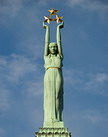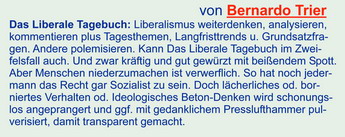|
Stand: 1. Juli 2001, 8:00 / 01.06.01
Freedom, an emotion
The person living alone on an island, doesnt have any idea or concept on free- dom. Once the second person arrives a social contract is set up. Now
and only now freedom is a matter of concern - for both inhabitants. A suspicion arrives to certainty: Freedom is a social function in the sense of freedom = f (society). Also the
suspicion that a thorough understanding of society on society
is not attainable by principle is a strong statement; so feeling is looking around the corner.
Which of the two inhabitants on the island is more free: The leader of both or the one who takes advantage from the leadership of the
other? Additional compli- cation results from the frequent dialectic contradiction, softer the incompatibility, between two or more persons claiming for a freedom. There lies one abandoned
coin at soil. Who has the right to take the coin? No doubt for liberals: The person arriving first. That means, a second person doesnt longer have the freedom to take the same coin. Sorry?
Yes.
But in a society of free men, freedom shall be attainable for everyone stating as social moral: My freedom has to be compatible with
the freedom of any other person. Problem solved? Not yet. Laws and norms define the rules of the social game. Problem solved? Not yet, because it is - also applying best intention - im-
possible to set up laws for every (future !) case or situation. But personal cons- cience do solve whatever isnt ruled by laws. Conscience indicates with greatest precision whether an action
disturbs inadmissibly other persons freedom. But there exists lots of people with lack of conscience. The norm do not interfere other persons freedom and a judge are the methods in a modern
society practi- cal problems should be solved. But: In dubious cases also the judge decides by conscience. Feeling enters the scene.
Reconsider the coin-case. In spite of the well established norm concerning the right of first it is clear that under specific
conditions one second person would consider his freedom restricted but an other would not; the busy manager hasting from one appointment to next will claim for more freedom; other unemployed
ma- nager would be happy having the opportunity to assist all the meeting the emplo- yed manager is bored with or is happy reading books the first is not interested. The known, at least the
expected conclusion: Free or not free is a matter of indi- vidual, very subjective appraisal. Feeling is full in scene.
So far the bottom up approach. Top down the conclusion that freedom is a matter of feeling arrives as well. If people is classified to
any extend into socially homo- geneous groups and we ask groupwise on freedom, answers will still differ subs- tantially. Why? Because any person has his own, certainly unique record. Their
feeling will be different. And feeling will differ on time scale also. More diversity desired?
The mother of human action, feeling, dominates the scene, whenever freedom is the topic, whenever freedom is the agenda. Let us
be satisfied and happy with this conclusion.
Social ethics would establish the goal to liberate freedom feeling for every mem- ber of society. It is clear that with necessarily
general state laws or state establi- shed rules, individual needs can in no case be covered. Bear in mind, that know- ledge of society on society will be kept very restricted for ever.
But we know also with certainty as stated before: Every member of society knows by conscience exactly what to do, what to undertake and
what action is to omit.
We are in face of a very specific why for liberalism, the spiritual backbone of civil society.
|


